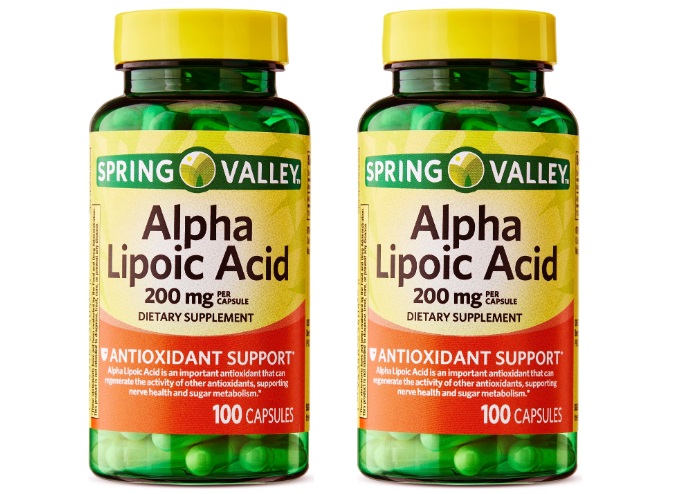Alpha Lipoic Acid Reduces Harmful Compounds in Type 2 Diabetes Patients with Neuropathy
Nikhil Prasad Fact checked by:Thailand Medical News Team Feb 14, 2025 1 month, 3 weeks, 6 days, 9 hours, 15 minutes ago
Medical News: Understanding the Role of Alpha Lipoic Acid in Diabetes Management
A groundbreaking study conducted by researchers from the University of Debrecen in Hungary has revealed that alpha-lipoic acid (ALA) supplementation can significantly reduce harmful compounds in patients with type 2 diabetes mellitus (T2DM) who suffer from neuropathy. This
Medical News report highlights how this naturally occurring antioxidant can play a crucial role in improving health outcomes for diabetic individuals.
 Alpha Lipoic Acid Reduces Harmful Compounds in Type 2 Diabetes Patients with Neuropathy
Alpha Lipoic Acid Reduces Harmful Compounds in Type 2 Diabetes Patients with Neuropathy
Neuropathy is a debilitating condition that affects nearly half of all diabetes patients at some point in their lives, leading to nerve damage, pain, and reduced quality of life. One of the primary culprits behind diabetic complications is the accumulation of harmful substances known as advanced glycation end products (AGEs), which damage nerves and blood vessels. Scientists sought to determine whether ALA, a powerful antioxidant known for its neuroprotective properties, could help reduce AGEs and improve nerve function in affected individuals.
Key Findings from the Study
The study was designed as a six-month clinical trial involving 54 patients with T2DM and neuropathy. These patients continued with their standard diabetes medications but were additionally given a daily oral dose of 600 mg of ALA. A control group of 24 diabetes patients without neuropathy was also included for comparison. Blood samples were collected at the start and end of the study to analyze levels of AGEs and other biomarkers.
Results from the study demonstrated that ALA treatment led to a significant reduction in AGE levels in patients with neuropathy. The baseline AGE plasma concentration was measured at 11.89 AU/µg, which decreased to 10.95 AU/µg after six months of supplementation (p = 0.017). This indicates that ALA has a tangible effect in reducing harmful glycation compounds, which are known to contribute to nerve damage and other complications in diabetes.
Interestingly, researchers found that levels of soluble receptors for AGEs (sRAGE) remained unchanged, meaning that ALA likely reduces AGEs through direct mechanisms rather than influencing receptor activity. Additionally, the study observed improvements in nerve function, as measured by the current perception threshold (CPT), which indicated enhanced nerve signaling and reduced nerve damage.
Implications for Diabetes Treatment and Neuropathy Management
The findings of this study provide strong evidence supporting the use of ALA as a supplementary treatment for diabetic neuropathy. By reducing AGEs, ALA may slow down the progression of nerve damage and help alleviate symptoms such as pain, numbness, and tingling in the extremities. Additionally, the study observed improvements in other key markers related to oxidative stress and vascular health, further reinforcing its potential benefits.
While glycemic control remains the primary focus of diabetes management, current
treatments often fall short in addressing the complications of neuropathy. The results of this study suggest that ALA supplementation could be a valuable addition to the existing therapeutic strategies for diabetic patients. Moreover, since ALA is widely available as an over-the-counter supplement, it presents a relatively accessible option for those seeking additional support in managing their condition.
Conclusion
In conclusion, this study highlights the promising role of alpha-lipoic acid in reducing advanced glycation end products and improving nerve function in type 2 diabetes patients with neuropathy. By offering a potential means to slow disease progression and alleviate symptoms, ALA supplementation could significantly enhance the quality of life for diabetic individuals. However, further research is needed to explore the long-term effects and optimal dosages for different patient populations.
The study findings were published in the peer-reviewed journal: Biomedicines.
https://www.mdpi.com/2227-9059/13/2/438
For the latest Diabetes News, keep on logging to Thailand
Medical News.
Read Also:
https://www.thailandmedical.news/news/alphalipoic-acid-guards-against-kidney-damage-caused-by-alcohol
https://www.thailandmedical.news/news/alpha-lipoic-acid-offers-new-hope-for-diabetic-pain-relief
https://www.thailandmedical.news/news/weight-loss-clinical-trial-study-led-by-oregon-state-university-shows-that-alpha-lipoic-acid-supplements-help-overweight-individuals-lose-weight
Follow us on:
https://x.com/ThailandMedicaX
https://www.facebook.com/ThailandMedicalNews
https://bsky.app/profile/thailandmedical.bsky.social
https://gettr.com/user/thailandmedicalnews
https://www.tribel.com/thailandmedical/wall
and 33 other social media platforms
